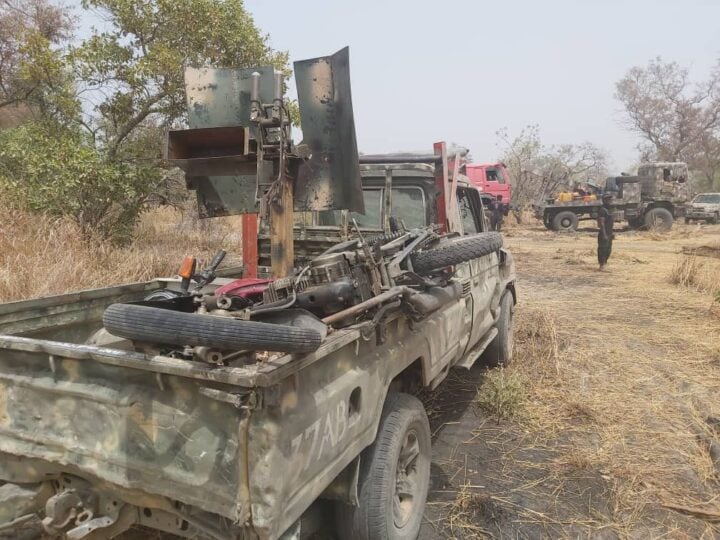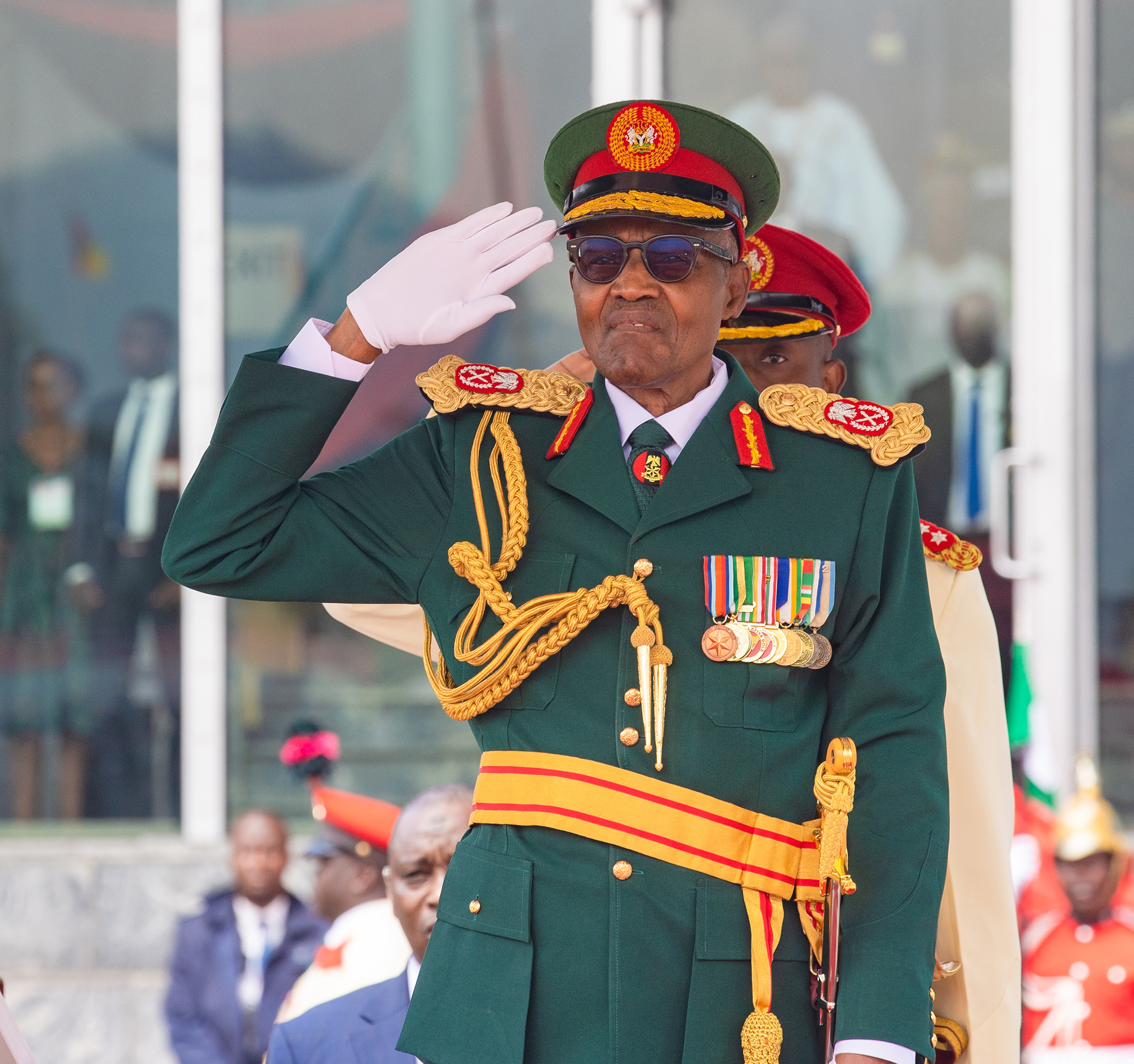File photo of troops battling insurgents
BY LEKAN OLAYIWOLA
In 2024 alone, over 2,000 Nigerians were killed in non-state violence, according to data from the Nigeria Security Tracker. More than 3.5 million Nigerians remain internally displaced, many from rural communities that the government no longer reaches. Yet this isn’t merely about insecurity; it’s about the withdrawal of the state as a visible actor in people’s lives.
What we call ‘ungoverned space’ is what rural Nigeria calls home. What makes them ‘ungoverned’ is that the people who live there haven’t seen government in years. The Nigerian state has little to no presence—territories where the absence of government is not temporary, but generational. And in these absences, danger thrives.
From the forests of Katsina and the creeks of the Niger Delta, to the forgotten wards of Benue and the smuggling routes of Borno, these areas have become sanctuaries for armed groups and arenas of local governance by warlords, vigilantes, or insurgents.
Advertisement
Yet to reduce ungoverned spaces to “security problems” alone is to miss their political roots and civic consequences. They are not just zones of state absence—they are territories of state betrayal.
What Makes a Space Ungoverned?
Contrary to popular belief, ungoverned doesn’t mean uninhabited or lawless. It means the official state infrastructure—police, courts, hospitals, roads, schools, elected representatives are absent, inactive, or mistrusted. But something always fills the vacuum. In the absence of government, non-state actors often step in as de facto authorities.
Advertisement
In Zamfara, bandit leaders run “peace committees,” negotiate access to farmlands, and tax locals. In Borno, insurgents have at times distributed food and adjudicated disputes in captured towns. In Southern Kaduna, ethnic militias protect villages where state security is considered complicit or absent. In the Niger Delta, oil thieves and armed youth groups govern creeks the Navy dares not enter.
These “shadow sovereignties” may provide temporary order, but they deepen distrust in the Nigerian state and fuel cycles of alternative legitimacy.
The Political Roots of State Retreat
Ungoverned spaces persist due to:
Advertisement
Historical Neglect: Some regions, especially in the rural north and oil-producing south, were never deeply integrated into Nigeria’s postcolonial state. Infrastructure stopped at the LGA capital. The people never expected much and got even less.
Strategic Ambiguity: Some zones are left untouched due to political calculations—ethnic sensitivities, electoral trade-offs, or elite complicity. In some zones, political elites tolerate weak state presence to placate or empower local militias aligned with dominant ethnic or religious blocs.
Clientelist Governance and Resource Extraction: When federal and state governments see remote areas primarily as vote banks or patronage targets, long-term governance investment is sacrificed for short-term electoral gain. Illicit mining, logging, and grazing often thrive in these areas, with powerful interests benefiting from weak oversight.
State Fragility and Security Triaging: With overstretched forces, the state often chooses which battles to fight and which territories to quietly abandon. Years of underinvestment in local governance, policing, and infrastructure have hollowed out the state’s reach.
Advertisement
Insecurity as Political Infrastructure
Ungoverned spaces are politically alive. Ungoverned spaces don’t just emerge; they are politically sustained. What happens there shapes the national crisis. In some cases, local power brokers have little incentive to resolve insecurity because chaos becomes capital. Political actors, especially during election cycles, often mobilise militias for voter suppression or ethnic intimidation. Elsewhere, state and federal governments engage in a blame game of jurisdiction, leaving border communities stranded between ministries and mandates.
Advertisement
In Afghanistan, Taliban strength was rooted not just in ideology, but in rural Pashtun areas long neglected by Kabul. U.S. presence was never matched with governance delivery. In Somalia, the absence of central authority encouraged local elders and Islamic courts to provide services, justice, and education. But the state’s failure to integrate them enabled extremist co-option.
Meanwhile, military presence is often episodic, kinetic, and untethered to civilian governance. Raids occur without follow-up services. Towns are reclaimed, only to be abandoned again. What’s left behind is not victory, but vacuum.
Advertisement
The Human Cost of Statelessness
Where the state is absent, civic life deteriorates. In communities like Shiroro, Zurmi, or Riyom, basic functions like schooling, farming, or dispute resolution have collapsed. Children grow up with no civic memory of the Nigerian state.
Advertisement
Local elders are forced to negotiate with gunmen. Displacement is not a one-time trauma but a chronic state of instability. The result is a slow unravelling of national identity replaced by fear, suspicion, and the normalization of self-rule by force.
More dangerously, ungoverned spaces provide fertile ground for radicalisation. Without schools, jobs, or protection, young men in these areas face a stark equation: join the oppressor, or remain unprotected. And in the absence of trusted law enforcement, citizens learn to solve problems through violence—deepening cycles of revenge, ethnic scapegoating, and militia proliferation.
A National Security Rethink
Nigeria’s current approach to ungoverned spaces leans heavily on militarised pacification, including raids, airstrikes, and arrests. But this is a holding tactic, not a strategy.
Ultimately, national security is not just about defending borders, it’s about defending belonging. Until ungoverned spaces are re-integrated into the national fold through governance, dignity, and trauma-responsive care, the seeds of instability will continue to grow.
A durable Solution Requires a Civic Reoccupation Doctrine
-
Map and Prioritise Fragile LGAs: A real-time vulnerability index should guide phased re-entry with tailored approaches.
-
Deploy Civic Infrastructure Before Guns: Schools, mobile courts, trauma clinics, and agricultural support must precede or accompany security deployments.
-
Engage Local Legitimate Actors: Chiefs, clergy, vigilante leaders, and women’s groups must co-author governance not just receive it.
-
Create Trauma-Informed Peace Units: Embed trained trauma responders into civic missions, healing trust and gathering intelligence through dignity.
-
Redesign Governance Access: Introduce solutions built for rugged terrains like solar-powered ID points, WhatsApp-based legal helplines, market-day town halls etc.
A New Political Imagination
Ungoverned spaces are not merely security blind spots. They are testaments to Nigeria’s uneven social contract. If left unaddressed, they threaten to metastasize into permanent zones of alienation—Nigeria’s internal archipelago of abandonment.
But if taken seriously, they could become laboratories of democratic renewal where governance is not restored but reimagined.
Insecurity is not always born of violence; it is born of invisibility. The task before Nigeria is not just to occupy territory, but to recover its people. One ward, one border town, one forgotten village at a time.
Lekan Olayiwola is a peace and conflict researcher and practitioner. He can be reached via [email protected]
Views expressed by contributors are strictly personal and not of TheCable.








